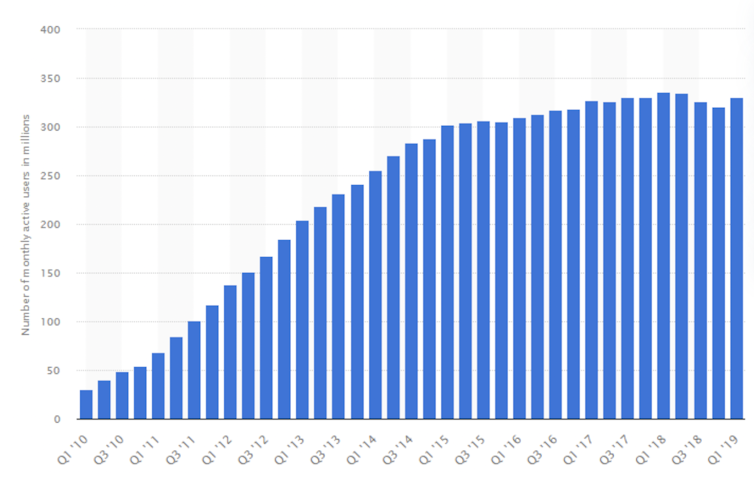What Elon Musk's US$3 billion Twitter deal means for him – and for social media
- Written by Hamza Mudassir, Lecturer in Strategy, Cambridge Judge Business School

The world’s richest man, Elon Musk, is now Twitter’s largest shareholder after acquiring a 9.2% stake[1] in the social media platform for just under US$3 billion (£2.3 billion). The announcement drove Twitter’s share price[2] up 27%, and it continued to grow in after-hours trading.
This investor enthusiasm is not surprising. Social media platforms have been suffering lately thanks to newly developed pressures in their ecosystems. For example, Twitter, and also Meta, have been on the receiving end of Apple’s anti user-tracking system. This is costing them billions of dollars[3] in lost revenues, causing both companies’ stock to languish for the past few months.
Musk’s arrival as Twitter’s largest shareholder will probably not make a difference to that issue, but it does address two other recent investor concerns. Firstly, Musk had been threatening to[4] create a competing social media network where “freedom of speech” ideals would be adhered to. The threat of a new popular entrant being created by a visionary tech leader now goes away. It also shows that Musk is coming in with a vision to drive change in the ecosystem, which is something not to be taken lightly.
Secondly, Musk’s presence has the potential to accelerate innovation and competitiveness at Twitter, which the company has not been able to do well enough in the past. With Jack Dorsey, the ex-CEO and co-founder of Twitter announcing his resignation[5] a few months ago, there is enough breathing room at the top to make bold moves that could help the platform to grow beyond the foundation it resides on today. So, we know that Twitter investors are happy – but over the long run, will users be?
The algo problem
Twitter is the equivalent of a digital town square, where endless numbers of people with a myriad of opinions can air their thoughts. Yet unlike a traditional town square, the voices that we hear are determined by underlying, machine-learning algorithms. These are geared towards maximising exposure and clicks, which drives advertising revenues. They are not geared towards enriching our lives with the most thoughtful, interesting points of view.
This inherent conflict between social and financial goals distorts who is heard and how frequently. This is exacerbated by the financial pressures for this town square to grow every financial quarter, which creates a pressure to constantly optimise the algorithms to attract as many clicks as possible. It also makes these algorithms a proprietary secret sauce, which creates an air of distrust and even mysticism around how such services operate.
Musk, who is famously a heavy Twitter user himself, has been vocal[6] about making social media algorithms more open source. We’ll have to see what he does in practice, but it’s a promising starting point that could become a boon for Twitter.
Open-source algorithms would eventually enable users to choose not just what they see and don’t see on the platform, but how that happens. In such a future, one user might choose a right-leaning algorithm while the other chooses a left-leaning one. The platform would not make the choice on these users’ behalf. Such an approach could boost Twitter’s traction, which has been flat[7] for some time. Time would tell how this might affect the company’s revenues, but such a bold move might put pressure on Facebook and others to follow suit, potentially making social media better for everyone.
Twitter’s monthly active users (millions)







